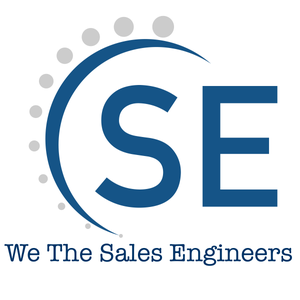
We The Sales Engineers: A Resource for Sales Engineers, by Sales Engineers
Ramzi Marjaba
A Resource for Sales Engineers, by Sales Engineers
- 30 minutes 47 secondsWhat Does a Great Solution Engineer Look Like?
I’m always asked, “What does a great SE look like?” The problem is there isn’t one way to SE. Great SEs look like. The role is complex, and people do it differently.
So, let’s delve into the role's complexity and break it down through an evaluation form I created. I cover various aspects such as working with account managers, discovery, demos, proof of value, and technical know-how. I also emphasize the importance of customer relations and leadership skills.
Finally, I have some news…
show notes: https://wethesalesengineers.com/show324
1 July 2024, 5:00 am - 54 minutes 3 secondsLearning To Sell Better From Being Sold Badly
Join us as we welcome Harman Bamra, who shares his unique journey from studying literature and international affairs to becoming a Solution Engineer (SE). Harman discusses his initial plans of becoming a diplomat, his background in literature, and how his passion for tech led him to digitize his family pharmacy business. Learn about his overlapping interests in tech and literature, the challenges he faced, and the strategies he used to transition into the corporate world of sales engineering. Harman also highlights the importance of understanding the 'why' behind customer needs and how his martial arts training influences his professional approach. Don't miss this insightful episode packed with practical advice for anyone looking to pursue a career in Solution Engineering
show notes: https://wethesalesengineers.com/show323
24 June 2024, 5:00 am - 1 hour 34 secondsEarning the Right to Ask Helpful Questions
The episode features an experienced sales trainer Richard Harris, discussing the intersection of sales and sales engineering. Richard shares insights on earning the right to ask questions, building trust with clients, and the concept of economic impact. He emphasizes the importance of proper communication and collaboration between salespeople and sales engineers (SEs), addressing common challenges and misconceptions. The conversation also touches on leadership accountability, the value of practice, and personal growth. Richard highlights the significance of self-awareness, mental health, and balancing personal and professional life. The episode provides tips and strategies for salespeople and SEs to enhance their effectiveness and cooperation.
Shownotes: https://wethesalesengineers.com/show322
17 June 2024, 5:00 am - 1 hour 25 secondsForget How, Focus on The Why!
Our guest today is Devon Montgomery, a Lead Solution Engineer at Collibra. Devon's path to Solution Engineering is interesting. It’s not just that he was an SDR who got into Solution Engineering; what he was before and how he got there are also interesting.
show notes: https://wethesalesengineers.com/show321
10 June 2024, 5:00 am - 26 minutes 18 secondsPromote Yourself to The CEO of Your Life and Career
Many of us let our careers happen to us. Imagine if a CEO of a company just LET whatever happens to his or her company happen. They would be fired immediately from their role. But we can go through our lives and careers without being intentional in how we want to live our lives.
Instead, if we look at our lives like a startup and we are the CEOs, we can then look at our salary as revenue, our skills as the products that we provide, and our time as the service, then we can look differently at our lives. We can make decisions on what to improve and how.
3 June 2024, 5:00 am - 28 minutes 16 secondsHow To Prepare for A Customer or Interview Demo
This is how I teach my #SolutionEngineers to prepare for their customer demos or their Interview demos.
show notes: https://wethesalesengineers.com/show319
27 May 2024, 5:00 am - 34 minutes 36 secondsChallenging Perspectives and Learning from Professional Disagreements
Last week I mentioned the 10 mistakes that #SolutionEngineers make that drive Salespeople crazy. This week Wesley comes to the defense of these SEs. Wes and I discuss the dynamics and challenges faced by SEs and account managers in tech sales. Wes shares his experiences and disagreements with certain points raised in a previous podcast episode about common mistakes SEs make, such as hijacking meetings and not following up. The discussion touches on the importance of good communication, trust, and feedback between SEs and sales reps, highlighting how effective management and understanding can prevent many issues.
show notes: https://wethesalesengineers.com/show318
20 May 2024, 5:00 am - 26 minutes 33 secondsTop 10 SE Mistakes that Drive AEs Crazy
So I’ve been in sales for a while. A few years now, and I’ve worked with several SE either as a sales person, a mentor, or a coach. And we love to joke around and talk crap about salespeople. I mentioned this before but on my first week on the job, I traveled to a quarterly training for both SEs and Sales. We had a common training session (marketing slides) and when that session was over and we were about to split up, my manager (SE manager) stood up and said “SEs stay here, those who have a lobotomy go to the other room.”
That’s how I was introduced to sales. It was a joke, and everyone laughed, but since then I knew I could make fun of salespeople because they do things that drive us crazy.
On the other hand, since I’ve been in sales there are things that SEs do that also drive me personally nuts. In the last couple of weeks, I’ve seen things that have made me so angry, I can see why AEs don’t want to bring SEs into meetings. Here are 12 things SEs do that drive salespeople crazy.
13 May 2024, 5:00 pm - 1 hour 7 secondsWork Behind The Curtin To Help Your Customers Better
I caught up with Chris White on his Linkedin Live show a bit ago. This time he interviews me and we dig into what happens behind the scenes, or at least what should happen behind the scenes to make sure that SEs are successful in front of the customer.
Everyone loves what we do on the front end, working directly with the customer, performing, and getting the Aha moment. However, we can not do any of that if we don’t prepare, if we don’t generate leads (even as SEs), or prepare for discovery, demos, and POV. We barely scratch the surface. But it’s a start.
show notes: https://wethesalesengineers.com/show316
6 May 2024, 5:00 am - 44 minutes 22 secondsCraving Cold Calls is a Matter of Perspective
AI is coming for us all. According to our guest, Anthony Palmoze, he’s heard many SEs talk about BDR being the first to become obsolete.
So we jump on a call to dig into what BDR is and see if it will be obsolete, or more specifically, what parts will be taken over by AI.
show notes: https://wethesalesengineers.com/show315
29 April 2024, 5:00 am - 59 minutes 12 secondsSelling to Sellers and How Solution Engineers Can Add Valu
I have my own opinions of what sales engineers should do, and how they should be involved in the sales process. My opinion is that they should be involved, early and often.
But I sell in the enterprise market, with a small number of customers. My SE is tied only to me, and the main decision-makers are the users who use the product. So it would make sense that my SE is heavily involved, follows up post-demo, and maintains relationships.
But when your product is being sold to other Salespeople, and the goal is to show them how easy it is to use, and the SE that supports your opportunities supports the opportunities of a few other salespeople, then the process and expectations are different. Adam Weekes is an AE Leader within Big Tin Can. He drops by the show to explain his views.
show notes: https://wethesalesengineers.com/show314
22 April 2024, 5:00 am - More Episodes? Get the App
Your feedback is valuable to us. Should you encounter any bugs, glitches, lack of functionality or other problems, please email us on [email protected] or join Moon.FM Telegram Group where you can talk directly to the dev team who are happy to answer any queries.
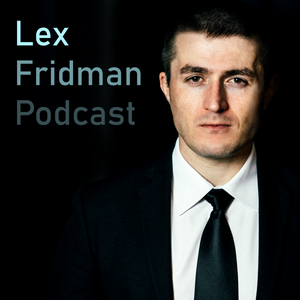 Lex Fridman Podcast
Lex Fridman Podcast
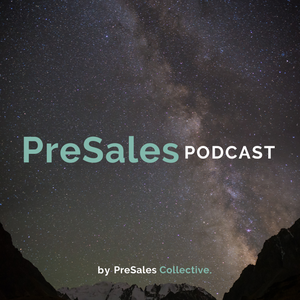 PreSales Podcast by PreSales Collective
PreSales Podcast by PreSales Collective
 HBR IdeaCast
HBR IdeaCast
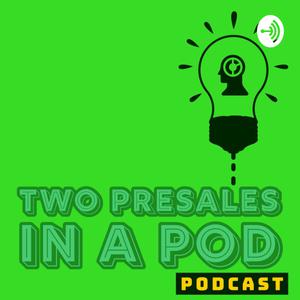 Two PreSales in a Pod
Two PreSales in a Pod
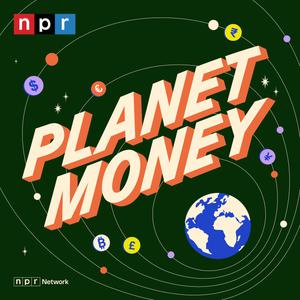 Planet Money
Planet Money
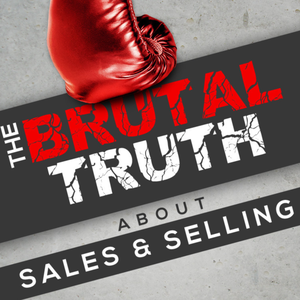 The Brutal Truth about Sales and Selling - We interview the world's best B2B Enterprise salespeople.
The Brutal Truth about Sales and Selling - We interview the world's best B2B Enterprise salespeople.